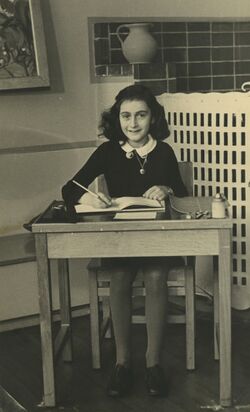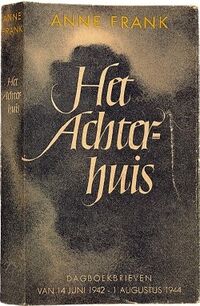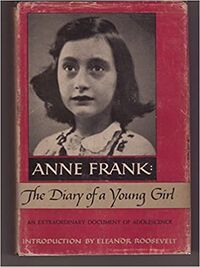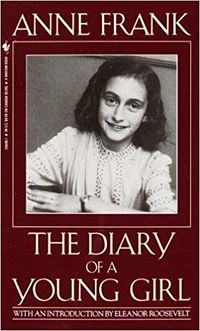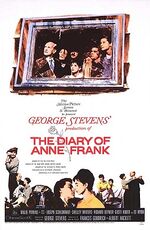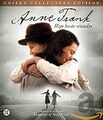Difference between revisions of "Category:Frank, Anne (1929-1945)"
(Created page with "thumb|250px thumb|200px|Dutch ed. (1947) thumb|200px|English ed. (1952) File:1952 Frank.jpg|thumb...") |
|||
| Line 18: | Line 18: | ||
Anne Frank (1929-1945) was born in Frankfurt, Germany, on June 12, 1929. She lived most of her life in or near Amsterdam, Netherlands, having moved there with her family as refugees at the age of four and a half when the Nazis gained control over Germany. In May 1940 Nazi Germany occupied the Netherlands and the persecution began. The Franks lost their German citizenship in 1941 and thus became stateless. As persecutions increased in July 1942, the Franks went into hiding in some concealed rooms behind a bookcase in the building where Anne's father, Otto Frank, worked. They spent almost two years there (Anne wrote her diary during that time), until they were arrested by the Gestapo in August 1944. Following their arrest, the Franks were transported to Westerbork and from there to Auschwitz. In October or November 1944, Anne and her sister, Margot, were transferred from Auschwitz to Bergen-Belsen concentration camp, where they died (probably of typhus) a few months later, probably in February 1945. | Anne Frank (1929-1945) was born in Frankfurt, Germany, on June 12, 1929. She lived most of her life in or near Amsterdam, Netherlands, having moved there with her family as refugees at the age of four and a half when the Nazis gained control over Germany. In May 1940 Nazi Germany occupied the Netherlands and the persecution began. The Franks lost their German citizenship in 1941 and thus became stateless. As persecutions increased in July 1942, the Franks went into hiding in some concealed rooms behind a bookcase in the building where Anne's father, Otto Frank, worked. They spent almost two years there (Anne wrote her diary during that time), until they were arrested by the Gestapo in August 1944. Following their arrest, the Franks were transported to Westerbork and from there to Auschwitz. In October or November 1944, Anne and her sister, Margot, were transferred from Auschwitz to Bergen-Belsen concentration camp, where they died (probably of typhus) a few months later, probably in February 1945. | ||
[[Category:Holocaust Children, 1929 (subject)]] | |||
[[Category:Holocaust Children, Germany (subject)]] | |||
[[Category:Holocaust Children, Netherlands (subject)]] | |||
[[Category:Holocaust Children Victims (subject)]] | |||
[[Category:Holocaust Children, Memoirs (subject)]] | |||
[[Category:Holocaust Children, Movies (subject)]] | |||
[[Category:Holocaust Refugee Children (subject)]] | |||
[[Category:Holocaust Refugee Children, Netherlands (subject)]] | |||
[[Category:Westerbork (subject)]] | |||
[[Category:Auschwitz (subject)]] | |||
[[Category:Bergen-Belsen (subject)]] | |||
[[Category:Westerbork (subject) | |||
[[Category:Auschwitz (subject) | |||
[[Category:Bergen-Belsen (subject) | |||
Revision as of 06:49, 20 March 2022
Anne Frank (F / Germany, Netherlands, 1929-1945), Holocaust victim.
- KEYWORDS : <Germany> <Netherlands> <Westerbork> <Auschwitz> <Bergen-Belsen>
- MEMOIRS : The Diary of a Young Girl (1947; ET 1952)
Biography
Anne Frank (1929-1945) was born in Frankfurt, Germany, on June 12, 1929. She lived most of her life in or near Amsterdam, Netherlands, having moved there with her family as refugees at the age of four and a half when the Nazis gained control over Germany. In May 1940 Nazi Germany occupied the Netherlands and the persecution began. The Franks lost their German citizenship in 1941 and thus became stateless. As persecutions increased in July 1942, the Franks went into hiding in some concealed rooms behind a bookcase in the building where Anne's father, Otto Frank, worked. They spent almost two years there (Anne wrote her diary during that time), until they were arrested by the Gestapo in August 1944. Following their arrest, the Franks were transported to Westerbork and from there to Auschwitz. In October or November 1944, Anne and her sister, Margot, were transferred from Auschwitz to Bergen-Belsen concentration camp, where they died (probably of typhus) a few months later, probably in February 1945.
Media in category "Frank, Anne (1929-1945)"
The following 61 files are in this category, out of 61 total.
- Anne Frank.jpg 800 × 1,317; 137 KB
- 1947 Frank.jpg 250 × 383; 49 KB
- 1950 Frank de.jpg 386 × 600; 52 KB
- 1950 Frank fr.jpg 331 × 499; 24 KB
- 1952 Frank en.jpg 374 × 499; 25 KB
- 1952 Levin (play).jpg 468 × 768; 95 KB
- 1954 Frank it.jpg 300 × 408; 13 KB
- 1955 Goodrich Hackett.jpg 729 × 1,024; 448 KB
- 1958 Schnabel (book).jpg 300 × 400; 15 KB
- 1958 Schnabel fr (book).jpg 332 × 500; 31 KB
- 1959 Duhamelet (book).jpg 400 × 527; 36 KB
- 1959 Frank.jpg 248 × 350; 16 KB
- 1959 Schnabel en (book).jpg 700 × 1,180; 142 KB
- 1959 Stevens film.jpg 254 × 390; 51 KB
- 1967 Segal film.jpg 259 × 195; 12 KB
- 1970 Steenmeijer (ed).jpg 300 × 421; 15 KB
- 1971 Steenmeijer en (ed).jpg 375 × 500; 30 KB
- 1980 Sagal film.jpg 310 × 413; 21 KB
- 1984 Merti (book).jpg 310 × 400; 28 KB
- 1987 Davies film.jpg 550 × 785; 69 KB
- 1987 Gies (book).jpg 400 × 637; 31 KB
- 1988 Erman film.jpg 232 × 429; 23 KB
- 1988 Hurwitz - Rosenberry.jpg 400 × 599; 35 KB
- 1988 Lindwer (doc).jpg 1,000 × 1,397; 71 KB
- 1988 Schloss.jpg 400 × 631; 23 KB
- 1991 Brown.jpg 1,424 × 1,808; 525 KB
- 1992 Lindwer.jpg 318 × 499; 27 KB
- 1995 Blair doc.jpg 580 × 859; 100 KB
- 1995 Boas.jpg 334 × 499; 30 KB
- 1995 Frank en.jpg 400 × 661; 218 KB
- 1995 Graver (book).jpg 400 × 630; 32 KB
- 1995 Lee.jpg 336 × 474; 19 KB
- 1995 Nagaoka (film).jpg 267 × 372; 13 KB
- 1996 Bennett (play).jpg 300 × 436; 52 KB
- 1997 Brenner.jpg 400 × 599; 126 KB
- 1997 Gold.jpg 400 × 586; 34 KB
- 1997 Maarsen en.jpg 1,920 × 2,560; 266 KB
- 1997 Melnick (book).jpg 400 × 648; 22 KB
- 1998 Immell (ed).jpg 312 × 500; 33 KB
- 1998 Müller (book).jpg 334 × 499; 24 KB
- 1998 Müller en (book).jpg 400 × 606; 30 KB
- 1998 Rittner (ed).jpg 346 × 499; 15 KB
- 1999 Bloom (ed).jpg 226 × 350; 14 KB
- 2000 Enzer (ed).jpg 400 × 597; 43 KB
- 2001 Bennett - Gottesfeld (novel).jpg 253 × 386; 54 KB
- 2001 Dornhelm film.jpg 312 × 445; 28 KB
- 2001 Müller es (book).jpg 1,003 × 1,644; 276 KB
- 2001 Netten (doc).jpg 230 × 345; 22 KB
- 2006 Lee.jpg 400 × 604; 41 KB
- 2006 Schloss.jpg 327 × 499; 21 KB
- 2009 Jones (film).jpg 450 × 637; 22 KB
- 2009 Prose (book).jpg 394 × 600; 79 KB
- 2010 Negrin (film).jpg 800 × 1,133; 157 KB
- 2013 Schloss.jpg 323 × 499; 27 KB
- 2015 Ley (doc).jpg 375 × 500; 44 KB
- 2016 Fouce (doc).jpg 1,000 × 1,294; 284 KB
- 2016 Steinbichler (film).jpg 846 × 1,200; 113 KB
- 2021 Folman (film).jpg 271 × 368; 88 KB
- 2021 Sombogaart (film).jpg 342 × 398; 24 KB
- 2022 Ensel (book).jpg 400 × 637; 174 KB
- 2022 Sullivan (book).jpg 400 × 604; 284 KB
- Holocaust Children, 1929 (subject)
- Holocaust Children, Germany (subject)
- Holocaust Children, Netherlands (subject)
- Holocaust Children Victims (subject)
- Holocaust Children, Memoirs (subject)
- Holocaust Children, Movies (subject)
- Holocaust Refugee Children (subject)
- Holocaust Refugee Children, Netherlands (subject)
- Westerbork (subject)
- Auschwitz (subject)
- Bergen-Belsen (subject)
